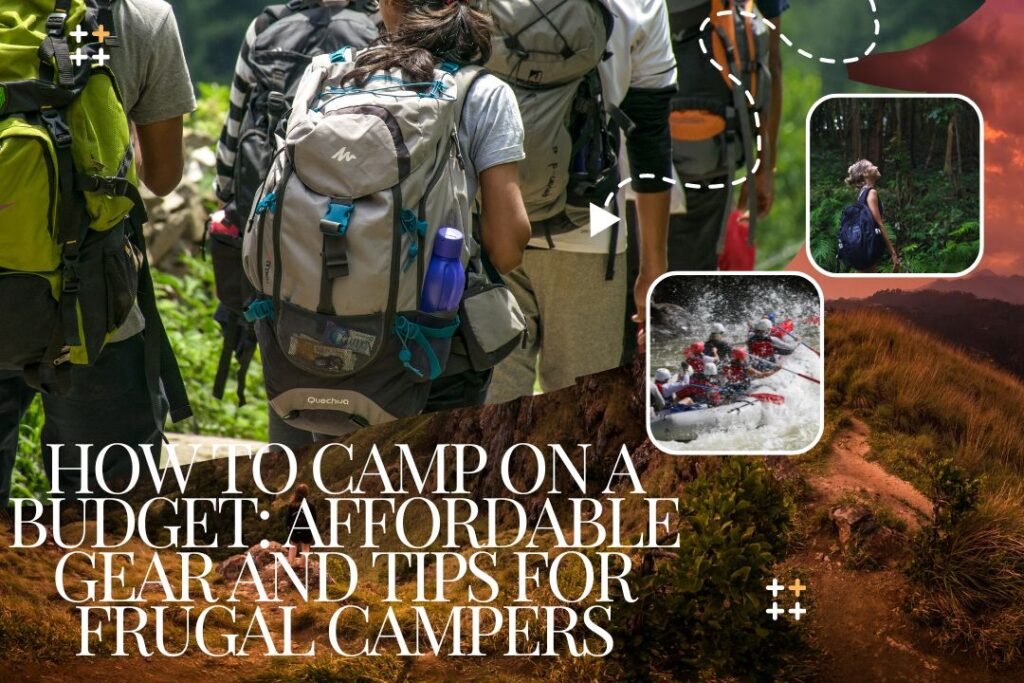Camping is an exciting and rejuvenating way to escape the daily grind, reconnect with nature, and enjoy the great outdoors. However, for many, the idea of camping can seem daunting due to the perceived cost of gear and other associated expenses. Fortunately, camping doesn’t have to break the bank. With the right approach, you can enjoy a memorable adventure without overspending. This guide will show you exactly how to camp on a budget with affordable gear and frugal tips for campers.
Why Budget Camping is Easier Than You Think
One of the greatest aspects of camping is its flexibility. You don’t need the latest high-tech gear or expensive tools to have a great time. In fact, some of the best experiences come from simplicity, allowing you to strip away the unnecessary and focus on the adventure. Whether you’re a beginner or a seasoned camper, camping on a budget is not only doable but also rewarding.
Key Benefits of Budget Camping:
- More frequent trips: Saving on camping expenses allows you to camp more often.
- Simplified experiences: With fewer gadgets, you can focus on nature and relaxation.
- Lower stress: Less money spent means less financial worry and more freedom to explore.
Essential Tips for Camping on a Budget
1. Plan Ahead and Research Free Campsites
One of the easiest ways to camp on a budget is to find free or low-cost campsites. Many national forests, Bureau of Land Management (BLM) lands, and wilderness areas offer free dispersed camping opportunities. These sites may not have the amenities of paid campgrounds, but they provide a raw and authentic outdoor experience.
Actionable Tip: Use online resources like FreeCampsites.net or Campendium to find free camping spots near your destination.
2. Borrow or Rent Gear Before Buying
If you’re new to camping, it can be tempting to splurge on gear, but before doing so, consider borrowing from friends or family. Many experienced campers have extra tents, sleeping bags, or stoves they’d be happy to lend. Alternatively, you can rent gear from outdoor stores like REI or from local camping rental services.
Actionable Tip: Before buying new gear, test it out by borrowing or renting. This helps you figure out what you actually need.
3. Look for Second-Hand Equipment
For those who are ready to invest in their own camping gear but don’t want to overspend, buying second-hand is the way to go. Thrift stores, garage sales, and online marketplaces like eBay, Facebook Marketplace, or Craigslist often have used camping gear at a fraction of the cost of new equipment.
Actionable Tip: Always check for wear and tear on second-hand items like tents and backpacks to ensure durability for your trip.
4. DIY Camping Gear
Getting creative with DIY camping gear can save you a lot of money. Some common household items can double as camping equipment. For example, use old blankets instead of buying sleeping bags or repurpose kitchen tools for camp cooking. Additionally, you can create your own fire starters by using cotton balls soaked in petroleum jelly.
Actionable Tip: Before heading out, look at your existing household items to see what can be repurposed for your camping needs.
5. Opt for Multi-Purpose Gear
Instead of purchasing specialized equipment for each camping activity, invest in versatile, multi-functional items. For example, choose a tarp that can be used as both shelter and a ground cover, or a multi-tool that combines knives, scissors, and screwdrivers in one.
Actionable Tip: Focus on gear that serves multiple purposes to reduce both costs and the amount of gear you need to pack.
6. Prepare Affordable and Simple Meals
Camping meals don’t need to be elaborate or expensive. Basic, non-perishable foods like rice, pasta, oats, and canned goods are both affordable and lightweight, making them great options for budget camping. Consider making one-pot meals, which save on ingredients and cleanup. Avoid pre-packaged camping meals, which are often expensive and full of preservatives.
Actionable Tip: Plan your meals in advance to minimize waste and opt for budget-friendly, easy-to-cook recipes like pasta or chili.
7. Travel Light and Save on Gas
Gas is often one of the most significant expenses when planning a camping trip. To minimize this cost, pack light and reduce the weight of your car. A lighter vehicle consumes less fuel, and fewer items mean less clutter and more comfort at the campsite. Additionally, carpooling with friends can significantly cut down transportation costs.
Actionable Tip: Use a fuel-efficient vehicle and consider carpooling to split gas costs among your group.
Affordable Gear Recommendations
If you’ve decided it’s time to invest in camping gear, here are some recommendations for affordable but reliable items:
1. Tents
- Coleman Sundome Tent: This is one of the most popular budget-friendly tents, offering great durability and weather resistance at a low price.
- ALPS Mountaineering Lynx Tent: Slightly higher in price but offers better durability and weather protection.
2. Sleeping Bags
- REVALCAMP Sleeping Bag: Lightweight, compact, and ideal for mild weather camping.
- Teton Sports Celsius Sleeping Bag: A bit more expensive but suitable for colder temperatures.
3. Backpacks
- Mountaintop Hiking Backpack: Affordable and has various sizes, making it suitable for both short and long trips.
- TETON Sports Explorer Backpack: A highly rated option for those looking for extra durability and features without a hefty price tag.
4. Stoves
- Coleman Classic Propane Stove: One of the best budget camping stoves, offering reliability and ease of use.
- BRS 3000T Ultra-Light Camping Stove: A compact, ultra-light stove perfect for minimalist campers.
Additional Money-Saving Tips for Frugal Campers
- Camp Off-Season: Campsites are cheaper and less crowded during the shoulder seasons (spring and fall).
- Join a Camping Club: Memberships in organizations like KOA or Good Sam offer discounts on campsites.
- Go with a Group: Camping with friends allows you to split costs on gear, food, and gas.
Avoid Unnecessary Extras
While camping stores often market high-end gadgets as “essential,” be cautious of falling into the trap of overbuying. Stick to what you need, and avoid purchasing items you’re unlikely to use.
Final Thoughts: Camping on a Budget Is Possible
Camping is one of the most affordable outdoor activities, especially if you’re mindful of your expenses. With the right approach, you can create unforgettable memories without splurging on expensive gear or campsites. Focus on simplicity, use what you have, and be resourceful. From borrowing equipment to preparing budget-friendly meals, these tips will help you enjoy a frugal camping adventure that doesn’t skimp on fun or comfort.
Now that you know how to camp on a budget, all that’s left is to pick your destination, gather your gear, and enjoy your time in nature!



